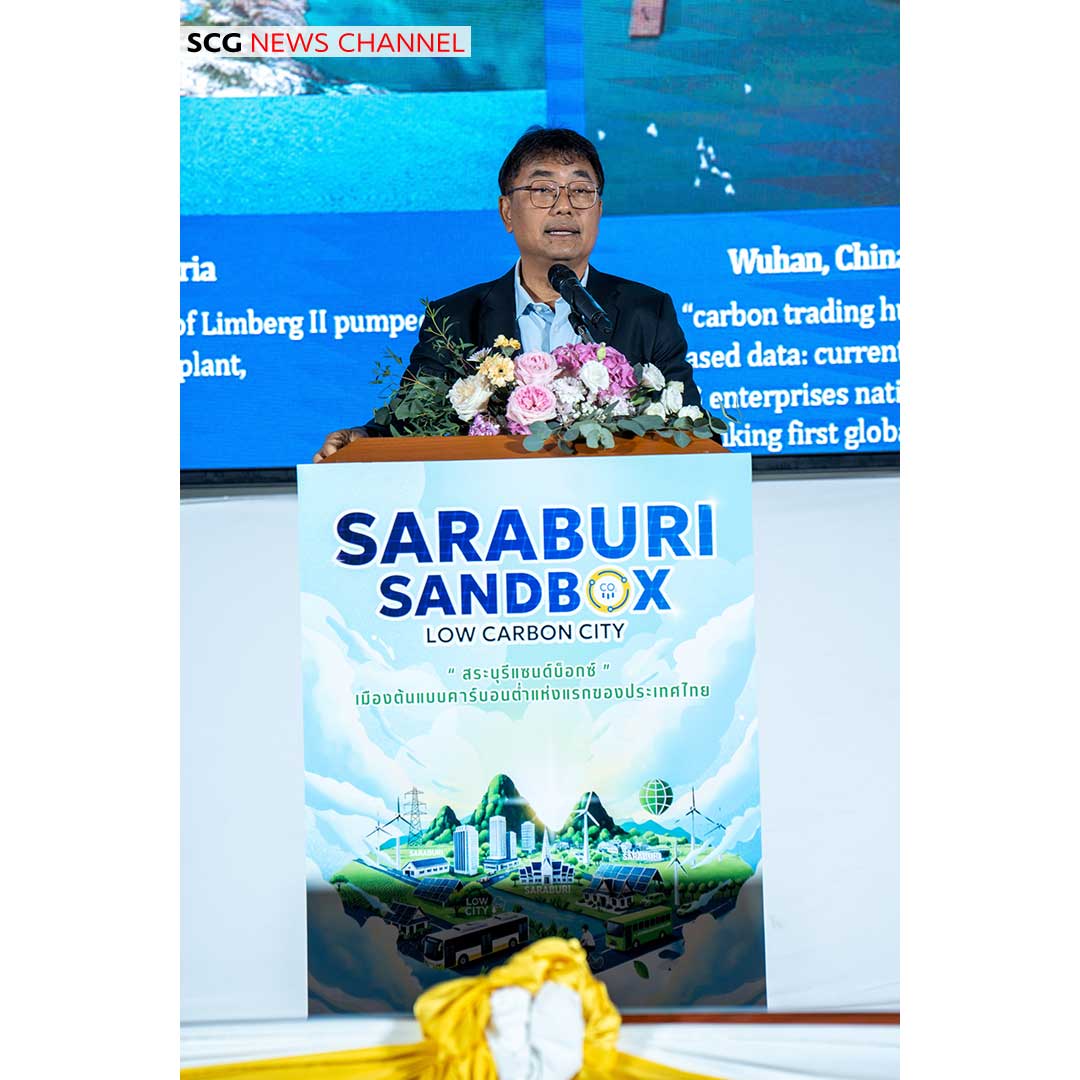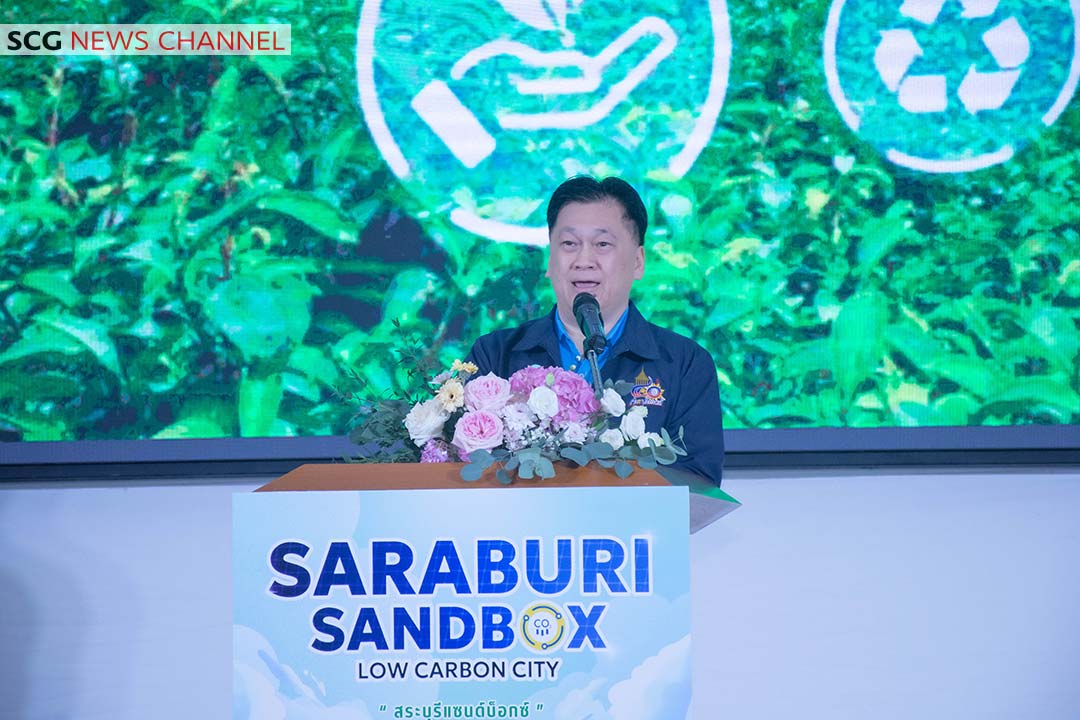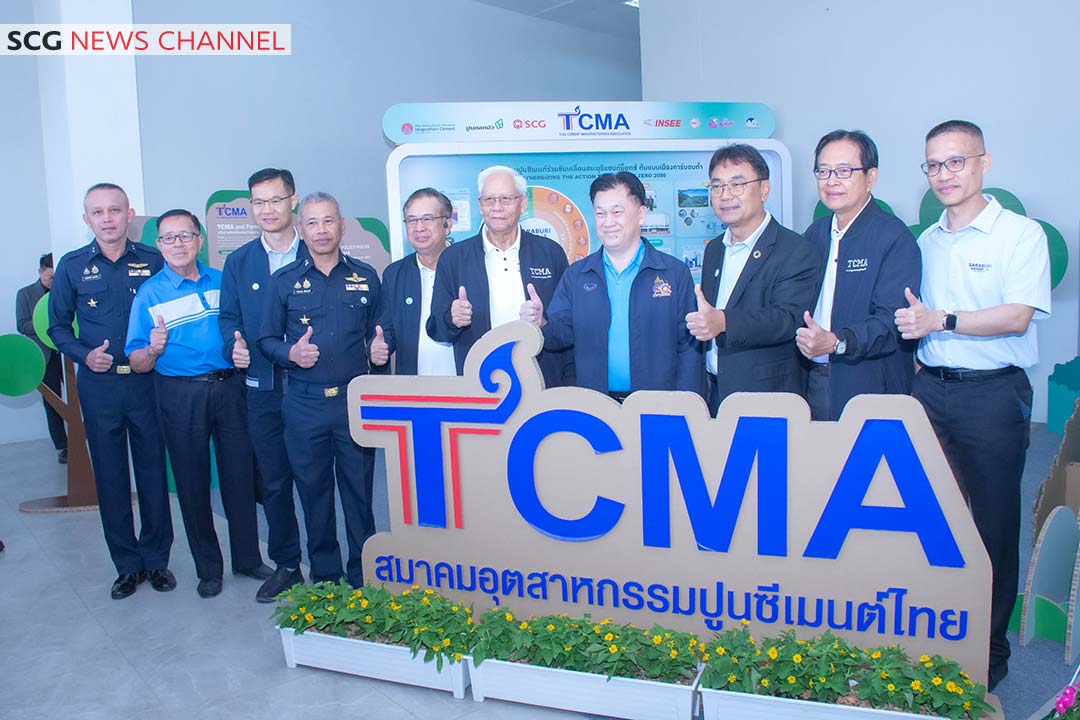SCG, together with Saraburi Province, Thai Cement Manufacturers Association, Saraburi Federation of Industries, and partners from government, private sector, and civil society, demonstrated one year of progress in the “Saraburi Sandbox: Joining Forces to Create Thailand’s First Low-Carbon City” at the Royal Thai Air Force Academy in Muak Lek District, Saraburi Province. The progress spans clean energy transition, promotion of green industry, and carbon value creation, supported by partnerships connecting international cooperation in technology and green funding towards the low-carbon city goal.
Dr. Chana Poomee, Chief Sustainability Officer, SCG and President of Thai Cement Manufacturers Association (TCMA) said, “SCG follows an Inclusive green growth approach aiming for sustainable growth across all sectors. We’ve joined forces with other cement manufacturers in the Thai Cement Manufacturers Association to drive Saraburi Sandbox towards becoming Thailand’s first low-carbon city model, with plans covering various aspects:
- Clean Energy Transition: Utilizing waste heat from chimneys for electricity generation, increasing renewable energy use such as solar power, biomass fuel, and Refuse-Derived Fuel (RDF) from municipal waste to replace coal. This helps reduce greenhouse gas emissions and PM 2.5 dust from agricultural waste burning, increases farmers’ income, and improves municipal and industrial waste management efficiency in Saraburi.
- Industrial Process and Product Use (IPPU): SCG has researched and developed clinker substitutes to produce low-carbon cement. One ton of low-carbon cement can reduce greenhouse gas emissions by 50 kg CO2 equivalent per ton. They’re also using nanotechnology to improve cement properties and adjusting usage standard requirements accordingly.
- Green and Smart Mining Enhancement: Making mining environmentally friendly while maximizing resource utilization, alongside area development management and environmental and community care following sustainable development guidelines.
- Studying carbon capture and utilization technology to drive towards net-zero goals by 2050. Additionally, Saraburi Sandbox is Thailand’s first industrial cluster accepted into the World Economic Forum’s Transitioning Industrial Clusters project.”
Dr. Chana further added that while the Saraburi Sandbox project has made significant progress, achieving the low-carbon city model requires innovation and integrated collaboration from multiple sectors, including international support. Organizations such as the Global Cement and Concrete Association (GCCA), United Nations Industrial Development Organization (UNIDO), and German International Cooperation (GIZ) are providing support, particularly in Green Funding and advanced technologies like Carbon Capture Utilization and Storage, to help the country’s industry transition to low-carbon operations as planned.

Mr. Bancha Chaowarin, Governor of Saraburi Province, revealed that “Saraburi Sandbox” is a collaborative effort from multiple sectors, working under four key principles: 1. Act immediately 2. No right or wrong – work processes can be adjusted anytime 3. Different opinions are welcome, but conflict is not – find appropriate solutions together 4. Smile to create enjoyment in working together. Saraburi Province is ready to be a pilot province for testing technologies, innovations, or serving as a research area for various organizations. The goal is to apply knowledge gained from experiments in the area and expand to other provinces to effectively reduce greenhouse gas emissions with concrete results in the near future. Additionally, local people and communities in Saraburi must benefit through better sustenance, income, and quality of life. Future operations will succeed through cooperation from all sectors, especially with government policy support that will facilitate change. If all sectors share common goals and working principles, Saraburi Sandbox will achieve operational success and can serve as a model for other provinces and organizations, while meeting national greenhouse gas reduction targets.

Mr. Charoenchai Chaliewkriengkrai, Chairman of the Saraburi Federation of Industries, disclosed that “Today’s event exceeded targets in terms of numbers, energy, and inspiration of participants. The Saraburi Federation of Industries, together with Saraburi Province, has laid out guidelines for other sectors in Saraburi wanting to participate further or expand to other areas. The Federation will act as a connector in sustainably pushing forward the low-carbon city initiative.”

“Saraburi Sandbox” is an area-based operation through Public-Private-People Partnership (PPP), led by the Saraburi Governor with three main partners – Saraburi Province, Thai Cement Manufacturers Association (TCMA), and Saraburi Federation of Industries, jointly driving Saraburi’s development towards a low-carbon city “SARABURI SANDBOX LOW CARBON CITY”. It connects cooperation among various domestic and international organizations. Over one year since the declaration of intent on August 15, 2023, progress has been made systematically, with ongoing goals in 5 main areas: 1. Clean energy transition 2. Green industry promotion 3. Creating value from waste materials 4. Promoting low-carbon agriculture and 5. Increasing green spaces. With support from government, private sector, civil society, and green funding sources, the aim is to reduce greenhouse gas emissions by 5 million tons CO2 equivalent by 2027.

Published on: Feb 3, 2025
 ดาวน์โหลดข่าว
ดาวน์โหลดข่าว